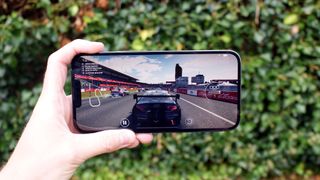This is why Apple iPhone's Bionic makes more sense than Samsung Galaxy's Exynos
Apple's stack control is key

Qualcomm recently let slip that it may be the only chipmaker inside Samsung’s next big flagship phone, the as-yet-unannounced Samsung Galaxy S23. Worldwide, if you have a Samsung Galaxy S22 you probably have a Qualcomm chip at the phone’s heart, but just over a quarter of the global market gets a custom-designed Samsung Exynos chip, instead.
When we heard the news that next year’s phone would be Qualcomm-exclusive, we reacted favorably.
This may seem counterintuitive. Apple makes its own Bionic chips for the Apple iPhone, and has even branched into making desktop-grade processors for its Mac machines. We’re fans of those chips, and we’ve touted their performance benefits. So why are we positive about Apple and its iPhone chips, but negative about Samsung and its Exynos brand? It’s all about the complete control that Apple has over its phones, inside and out.
Apple doesn't make Apple chips
Let’s be clear about who is actually making the chips. There are very few chip manufacturing plants, called foundries, in existence that can produce the bleeding-edge, compact processor needed in an Samsung Galaxy S22 or an Apple iPhone 13. In fact, there are only two companies up to the task: TSMC and Samsung’s Semiconductor branch. Apple designs the Bionic chip, but TSMC is the company that currently produces it. This isn’t to slight Samsung; plenty of Apple iPhone components are made by its biggest competitor.
Both foundries produce Qualcomm Snapdragon 8 chips, like the Snapdragon 8 Gen 1 also used in the Samsung Galaxy S22 phone. Though it bears the Samsung name, Samsung Semiconductor operates like an entirely separate company from its colleagues. There is a legal business firewall separating Samsung Semiconductor from the phone-making branch Samsung Electronics, because Semiconductor also sells chips to Samsung’s competitors.
So, when we say that Apple makes a chip, what we mean is that Apple designs a chip, then has another company make the chip. When Samsung makes the chip, it actually makes the chip, but it may as well be another company.
Samsung doesn’t make Android
Unfortunately, Samsung does not make the operating system that the Exynos chip will run. Apple can streamline the next A16 chip, for instance, to work perfectly with iOS 16. There is no intellectual wall separating the team designing iOS from the team designing the A16. It is all Apple, and this synergy has proven to work well.
Get daily insight, inspiration and deals in your inbox
Get the hottest deals available in your inbox plus news, reviews, opinion, analysis and more from the TechRadar team.
Google designs its own chipset, the Tensor chips used in the recent Google Pixel 6 family. While it is true that Google designed Tensor specifically for its Pixel family, Google designed Android to be sold to third-party vendors. That means it must be robust and adaptable. The OS and the chips work well together, but Google also has different priorities. Even the Google Pixel 6 Pro is sold as Google’s fastest phone, not the fastest phone you can buy, unlike the Samsung Galaxy S family that always looks to dominate in terms of performance.
It is possible that Samsung could create a chip to rival the Qualcomm Snapdragon family. In recent years, benchmarks have revealed that Samsung Galaxy S devices equipped with the Exynos chips perform poorly compared to Qualcomm siblings, but this has not always been true. The difference has often been negligible, and in rare cases, Exynos has taken the advantage.
Still, without the tightest integration between the chip designers and the operating system coders, Samsung will never have the advantage that Apple retains by keeping everything in-house.

Phil Berne is a preeminent voice in consumer electronics reviews, having reviewed his first device (the Sony D-EJ01 Discman) more than 20 years ago for eTown.com. He has been writing about phones and mobile technology, since before the iPhone, for a variety of sites including PCMag, infoSync, PhoneScoop, and Slashgear. He holds an M.A. in Cultural Theory from Carnegie Mellon University.
Phil was the internal reviewer for Samsung Mobile, writing opinions and review predictions about top secret new devices months before launch. He left in 2017. He worked at an Apple Store near Boston, MA, at the height of iPod popularity. He has been a High School English teacher at Title I schools, and is a certified Lifeguard. His passion is smartphones and wearables, and he is sure that the next big thing will be phones we wear on our faces.
